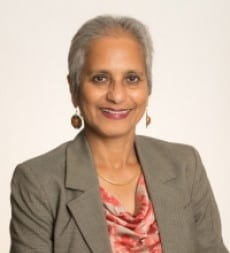Tuesday, August 4, 2020
12:30 pm – 2:00 pm EDT
WebEx
We were pleased to invite you to the webinar series “Facing Inequality”, hosted by the Institute for International Economic Policy. This virtual series focuses on current and emerging inequality issues in the U.S. and around the globe. The series brings attention to aspects of inequality being made increasingly relevant by the current COVID-19 pandemic and associated crises. The series is organized under the stewardship of IIEP Director James Foster, Oliver T. Carr, Jr. Professor of International Affairs and Professor of Economics, and IIEP Faculty Affiliate Trevor Jackson, Assistant Professor of History. The series is co-sponsored by the GW Interdisciplinary Inequality Series, co-organized by Prof. Jackson from the Department of History and Prof. Bryan Stuart from the Department of Economics.
The seventh event, “Are Informal Workers Benefiting from Globalization? Evidence from a Survey Experiment in India” featured Dr. Nita Rudra of Georgetown University. The discussion focused on the following: Are citizens in the developing world convinced about the benefits of globalization? By leveraging their comparative advantage in low labor costs, economists predict once-poor citizens will be better off with open markets. Yet, surprisingly little rigorous research exists on if and how workers in developing countries actually experience the benefits of increasing trade and foreign direct investment (FDI), particularly in an era of rapidly expanding global supply chains. To answer this question, we focused on the largest cluster of low-wage laborers in developing countries, informal workers, and their experience with FDI. Using observational and experimental methods, we find that both formal and informal workers in India strongly approve of foreign investment. However, the latter are deeply skeptical that the benefits of FDI will ever trickle down to themselves or their future generations. India’s much smaller population of formal workers, by contrast, are confident that they have privileged access to coveted jobs in foreign firms – regardless of skill level- and social mobility prospects will improve. These findings provide new insights on (macro and micro-level) drivers of growing global inequalities, and call for caution amongst scholars, policymakers, the international business community, and all those who anticipate that globalization is lifting all boats.
About the Moderator:
 James Foster is the Oliver T. Carr, Jr. Professor of International Affairs, Professor of Economics, and Co-Director of the Institute for International Economic Policy at the George Washington University. He is also a Research Associate at the Oxford Poverty and Human Development Initiative at Oxford University. Professor Foster’s research focuses on welfare economics — using economic tools to evaluate and enhance the wellbeing of people. His work underlies many well-known social indices including the global Multidimensional Poverty Index (MPI) published annually by the UNDP in the Human Development Report, dozens of national MPIs used to guide domestic policy against poverty, the Women’s Empowerment in Agriculture Index (WEAI) at USAID, the Gross National Happiness Index of Bhutan, the Better Jobs Index of the InterAmerican Development Bank, and the Statistical Performance Index of the World Bank. Prof. Foster received his PhD in Economics from Cornell University and has a Doctorate Honoris Causa from Universidad Autónoma del Estado Hidalgo (Mexico).
James Foster is the Oliver T. Carr, Jr. Professor of International Affairs, Professor of Economics, and Co-Director of the Institute for International Economic Policy at the George Washington University. He is also a Research Associate at the Oxford Poverty and Human Development Initiative at Oxford University. Professor Foster’s research focuses on welfare economics — using economic tools to evaluate and enhance the wellbeing of people. His work underlies many well-known social indices including the global Multidimensional Poverty Index (MPI) published annually by the UNDP in the Human Development Report, dozens of national MPIs used to guide domestic policy against poverty, the Women’s Empowerment in Agriculture Index (WEAI) at USAID, the Gross National Happiness Index of Bhutan, the Better Jobs Index of the InterAmerican Development Bank, and the Statistical Performance Index of the World Bank. Prof. Foster received his PhD in Economics from Cornell University and has a Doctorate Honoris Causa from Universidad Autónoma del Estado Hidalgo (Mexico).
About the Speaker:

Nita Rudra is a Professor of Government at Georgetown University. Her research interests include: the distributional impacts of trade and financial liberalization as they are mediated by politics and institutions; the influence of international organizations on policies in developing economies; the politics of trade agreements involving developing economies, and the causes and effects of democracy in globalizing developing nations. Her most critical works appear in the British Journal of Political Science, World Politics, Journal of Politics, American Journal of Political Science, Comparative Political Studies, International Organization and International Studies Quarterly . Her most recent book with Cambridge University Press is entitled: Democracies in Peril: Taxation and Redistribution in Globalizing Economies. Her current projects analyze how and why widespread poverty persists in rapidly globalizing economies, the politics supporting/resisting changes to the informal sector, the anti-globalization backlash, and the politics of trade and trade agreements.
About the Discussants:
 Maggie Chen is Professor of Economics and International Affairs at George Washington University. She has served as Director of GW’s Institute for International Economic Policy and worked as an economist in the research department of the World Bank and a consultant for the World Bank, the International Finance Corporation, the Inter-American Development Bank, and the U.S. Congressional Budget Office. Professor Chen’s research areas include multinational firms, international trade, and regional trade agreements. Her work has been published in academic journals such as the Review of Economics and Statistics, American Economic Journal: Applied Economics, American Economic Journal: Economic Policy, Journal of International Economics, and Journal of Development Economics. She is a co-editor of Economic Inquiry and an associate editor of Economic Modeling.
Maggie Chen is Professor of Economics and International Affairs at George Washington University. She has served as Director of GW’s Institute for International Economic Policy and worked as an economist in the research department of the World Bank and a consultant for the World Bank, the International Finance Corporation, the Inter-American Development Bank, and the U.S. Congressional Budget Office. Professor Chen’s research areas include multinational firms, international trade, and regional trade agreements. Her work has been published in academic journals such as the Review of Economics and Statistics, American Economic Journal: Applied Economics, American Economic Journal: Economic Policy, Journal of International Economics, and Journal of Development Economics. She is a co-editor of Economic Inquiry and an associate editor of Economic Modeling.
 Deepa Ollapally is a political scientist specializing in Indian foreign policy, India-China relations, and Asian regional and maritime security. She is Research Professor of International Affairs and the Associate Director of the Sigur Center. She also directs the Rising Powers Initiative, a major research program that tracks and analyzes foreign policy debates in aspiring powers of Asia and Eurasia. Dr. Ollapally is currently working on a funded book, Big Power Competition for Influence in the Indian Ocean Region, which assesses the shifting patterns of geopolitical influence by major powers in the region since 2005 and the drivers of these changes. She is the author of five books including Worldviews of Aspiring Powers (Oxford, 2012) and The Politics of Extremism in South Asia (Cambridge, 2008). Her most recent books are two edited volumes, Energy Security in Asia and Eurasia (Routledge, 2017), and Nuclear Debates in Asia: The Role of Geopolitics and Domestic Processes (Rowman & Littlefield, 2016). Dr. Ollapally has received grants from the Carnegie Corporation, MacArthur Foundation, Smith Richardson Foundation, Ford Foundation, the Rockefeller Foundation, and the Asia Foundation for projects related to India and Asia. Previously, she was Associate Professor at Swarthmore College and has been a Visiting Professor at Kings College, London and at Columbia University. Dr. Ollapally also held senior positions in the policy world including the US Institute of Peace, Washington DC and the National Institute of Advanced Studies, Bangalore, India. She is a frequent commentator in the media, including appearances on CNN, BBC, CBS, Diane Rehm Show and Reuters TV. She holds a Ph.D. in Political Science from Columbia University.
Deepa Ollapally is a political scientist specializing in Indian foreign policy, India-China relations, and Asian regional and maritime security. She is Research Professor of International Affairs and the Associate Director of the Sigur Center. She also directs the Rising Powers Initiative, a major research program that tracks and analyzes foreign policy debates in aspiring powers of Asia and Eurasia. Dr. Ollapally is currently working on a funded book, Big Power Competition for Influence in the Indian Ocean Region, which assesses the shifting patterns of geopolitical influence by major powers in the region since 2005 and the drivers of these changes. She is the author of five books including Worldviews of Aspiring Powers (Oxford, 2012) and The Politics of Extremism in South Asia (Cambridge, 2008). Her most recent books are two edited volumes, Energy Security in Asia and Eurasia (Routledge, 2017), and Nuclear Debates in Asia: The Role of Geopolitics and Domestic Processes (Rowman & Littlefield, 2016). Dr. Ollapally has received grants from the Carnegie Corporation, MacArthur Foundation, Smith Richardson Foundation, Ford Foundation, the Rockefeller Foundation, and the Asia Foundation for projects related to India and Asia. Previously, she was Associate Professor at Swarthmore College and has been a Visiting Professor at Kings College, London and at Columbia University. Dr. Ollapally also held senior positions in the policy world including the US Institute of Peace, Washington DC and the National Institute of Advanced Studies, Bangalore, India. She is a frequent commentator in the media, including appearances on CNN, BBC, CBS, Diane Rehm Show and Reuters TV. She holds a Ph.D. in Political Science from Columbia University.


